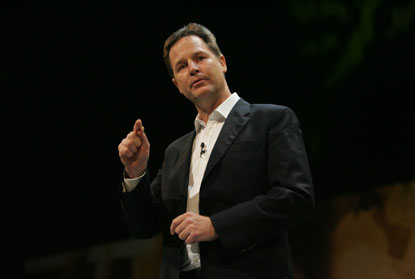Secondary schools in England are to receive additional funding to help pupils who have fallen behind in English and maths at primary school, Deputy Prime Minister Nick Clegg announced today.
 In his closing speech to the Liberal Democrat party conference, Clegg told delegates the new ‘catch-up premium’ would help children ahead of the planned exam to replace GCSEs. Secondary schools will receive an additional £500 for every pupil who left primary school below the expected level in English or maths for their age, known as level 4 in Key Stage 2.
In his closing speech to the Liberal Democrat party conference, Clegg told delegates the new ‘catch-up premium’ would help children ahead of the planned exam to replace GCSEs. Secondary schools will receive an additional £500 for every pupil who left primary school below the expected level in English or maths for their age, known as level 4 in Key Stage 2.The money, which has been found from departmental underspends, will be allocated until the government’s Comprehensive Spending Review period ends in 2015. Schools will receive the first payments in January for pupils starting secondary school this September. It is estimated that 110,000 pupils will fail to meet the standard in the first year, meaning £55m will be provided.
The additional funding should be used to get children up to the minimum level through measures such as summer schools, catch-up classes and one-to-one tuition.
Clegg said the support would reassure parents ahead of the introduction of the new English Baccalaureate exam from 2017. Replacing GCSEs would create a ‘more rigorous, more credible qualification’ that virtually every child would be able to take, he added.
‘If you’re a parent whose child has fallen behind, who fears they might get lost in that daunting leap from primary to secondary school and who is worried by talk about making exams tougher, let me reassure you: we will do whatever it takes to make sure your child is not left behind.
‘So, yes, we’re raising the bar. But we’re ensuring every child can clear it too.’
It is expected that the funding will be allocated in a similar way to the existing pupil premium, with schools free to decide which type of additional support is best for each pupil.
Responding to the announcement, Christine Blower, general secretary of the National Union of Teachers, said: ‘Every teacher knows that there are children in their classes who could benefit from extra help.’
However, she warned that ‘it must be clear that this is new and additional money’ to avoid the cash going the way of the pupil premium, which schools are failing to use effectively, according to regulator Ofsted.
Chris Keates, general secretary of the National Association of Schoolmasters/Union of Women Teachers, added that although any extra funding was welcome, more detail was needed on where the money was coming from. ‘The Department for Education says the funding is from an “underspend” in the DfE budget. At a time of severe cuts to education spending’ how exactly has such a large underspend occurred and in which area of the budget?’





















